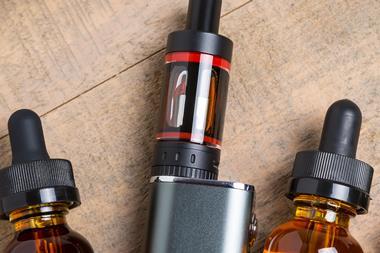
Almost all vape device and vape juice producers in the UK are failing to comply with legal obligations to fund recycling, according to new research.
Just 16 of the more than 150 biggest vape brands have registered to comply with environmental regulations concerning electrical waste, which requires them to fund the recycling of the tonnage equivalent to what they put on the market.
In addition, the larger vape producers and importers, which had registered with UK environment agencies, “are not covering the true costs of collection and recycling” Material Focus claimed.
Scott Butler, executive director of the not-for-profit organisation, described the findings as “shocking”.
“As sales and profits have boomed, the environmental impacts and costs of collecting and recycling waste vapes have been disregarded,” Butler said.
The analysis examined the company records of more than 150 vape and vape juice producers in the UK, and identified that “only 16 had registered to comply with environmental regulations for producer responsibility for waste electricals, portable batteries, and packaging”. Yet all had vape industry trade association membership and had registered their products with the Medicines & Healthcare products Regulatory Agency (MHRA).
Discarded vapes have wide-ranging environmental impacts, including from the toxicity of the nicotine liquid in disposables and pods, and the loss of precious metals such as lithium and copper.
According to electricals recycling company GAP Group, a typical disposable vape contains 0.15g of lithium and 50cms or 1.9g of copper cable. Vapes heading to landfill also pose a fire risk, with more than 700 fires caused annually by the incorrect disposal of electricals with hidden batteries, such as vapes, Material Focus said.
Disposable single-use vapes – which dominate the category – are the worst offenders. Last year, Material Focus research identified that around 1.3 million disposable vapes are littered and binned every week.
The latest analysis calculates that if the recycling of 138 million disposable vapes bought in the UK each year was funded, “as they should be, by these producers”, this would cost producers up to £69m per annum.
“It is shocking that it seems that the majority of the smaller vape producers in the UK aren’t complying with these long-standing environmental regulations,” Butler said.
“And for those larger producers that have only recently registered, they need to bear the full costs of collecting and recycling these complex-to-recycle products, which may mean paying significantly higher fees than they are currently paying.
“Vape producers, importers and retailers need to be held to account, and step up to the plate by making sure that we do not lose the precious materials contained inside these vapes,” he added.
The sector has long struggled with reducing the environmental harm caused by its products. Responsibility for recycling the devices is left to consumers, who typically need to take apart their vapes and recycle the component parts separately. This usually requires a visit to a local authority recycling centre, or returning them to stores. According to a joint investigation by Material Focus and the Bureau of Investigative Journalism last year, more than half of single-use vapes simply get thrown away.
Many of the devices do not even make it to the household bin. In Dundee, the problem of littered single-use vapes has become so bad the city is considering banning their sale completely.
UK Vaping Industry Association director general John Dunne said: “The industry recognises its responsibilities to the environment but the recycling of vapes is not straightforward, as it needs collaboration between adult vapers, retailers, manufacturers, the regulators and companies in the waste management sector.
“Up to now there has been genuine confusion amongst the vaping sector about their responsibilities,” Dunne added.



















No comments yet